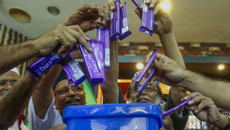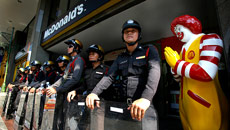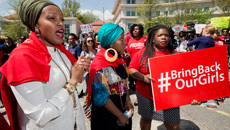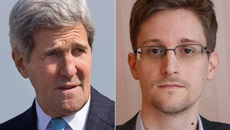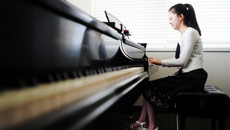India-born scientist Arogyaswami Joseph Paulraj and mathematics scholar Himanshu Asnani at Standford University in the Silicon Valley have been awarded prizes by the Marconi Society in Washington.
Paulraj, 69, was honoured Tuesday with the prestigious Marconi Prize for his pioneering work on developing wireless technology to transmit and receive data at high speed.
Asnani, 27, received the Society's Paul Baran Young Scholar Award for contributing to point-to-point and multi-terminal channel coding and source coding problems.
Named after radio inventor and Nobel laureate Guglielmo Marconi(1874-1937), Marconi Society awards annually individuals whose work and influence emulate the principle of creativity in service to humanity.
Marconi's daughter Gioia Marconi Braga had set up the society in 1974 through an endowment.
Paulraj, donated his cash prize of $100,000 (Rs.60 lakh) to the Society's young scholar programme.
Asnani was also presented with a cash prize of $4,000 (Rs.2.4 lakh).
India-born American scientist and Hitachi America professor of engineering, emeritus at Stanford Thomas Kailath presented the awards to the achievers.
"It has been a privilege to have known Paulraj as a student, a research fellow and a warm colleague for many years," Pune-born Kailath said at the award ceremony.
After receiving the award, Paulraj said the society was playing a key role through recognition and scholarships to enhance social, economic and cultural values.
"As it's an honour to be named a fellow of Marconi Society, I will do best to be worthy of it. This is the highest recognition in the ICT (information and communications technology), which is significant for India's growth," Paulraj told IANS from Washington.
Overwhelmed by the honour at a young age, Asnani credited his parents and teachers for their love and guidance during his career pursuit.
"I dedicate this award to my mentor and spiritual guide Srila Prabhupada, founder of Iskon (International Society for Krishna Consciousness) and whose teachings had a great impact in my life," Asnani told IANS.
"Wisdom of the east should come together with the technology of the west to create a spirit of selfless giving to society and humanity at large," Asnani observed.
Paulraj joins a select group of IT pioneers who received the Marconi prize in past such as World Wide Web (www) creator Tin Berners-Lee, father of internet Vint Cerf, Google co-founder Larry Page and mobile phone developer Martin Cooper.
"To have three generations of Indian achievers in ICT - Kailath, Paulraj and Asnani - at an event is a testament to the contribution Indians are making at the cutting-edge of technology," IndiaTechOnline.com editor Anand Parthasaraty told IANS here Saturday.
Indian consul general at San Francisco N. Parthasarathi and India-born Microsoft researcher Aakanksha Chowdhery, first women to receive the Marconi young scholar award in 2012, participated in the award ceremony.
"Paulraj's contributions to wireless technology and the resulting benefit to humankind, are indisputable. Every WiFi (wireless fidelity) router and 4G phone uses Multiple Input-Multiple Output (MIMO) technology pioneered by him,"Society chairman David Payne said at the event.
MIMO boosts data rate by creating multiple parallel spatial data streams and is the key to the latest wireless broadband networks like 4G cellular.
Born in Coimbatore in Tamil Nadu, about 360 km from here, Paulraj was also honoured with the IEEE Alexander Graham Bell Medal in 2011 for his profound work on theoretical foundations of MIMO.
Asnani, who hails from Kota in Rajasthan, is also a system engineer at the Swedish telecom major's R&D centre in the Silicon Valley, off the US west coast, besides pursuing doctorate (Ph.D) in mathematics at Stanford University's Electrical Engineering School.
Graduating from IIT-Bombay in electrical engineering in 2009, Asnani went to the US to do masters (MS) at Stanford and enrolled for Ph.D in the same subject.
